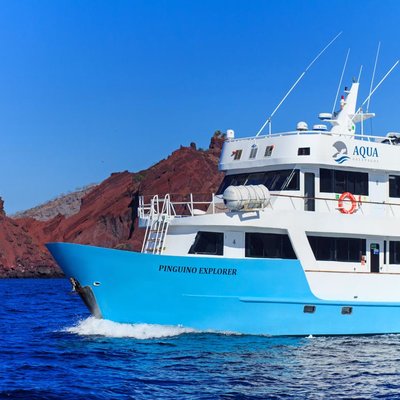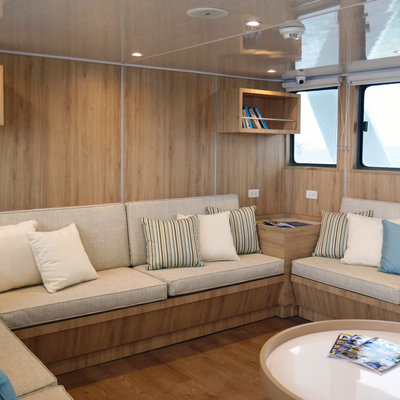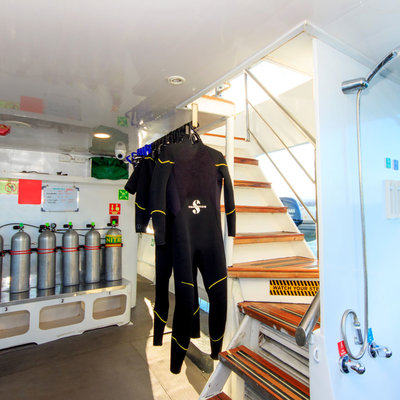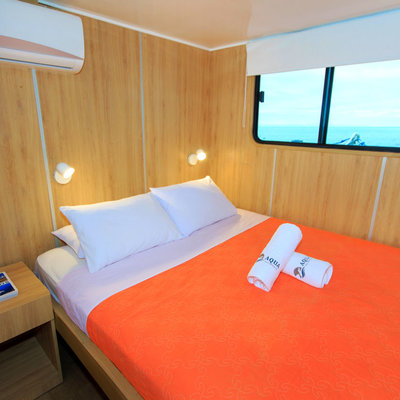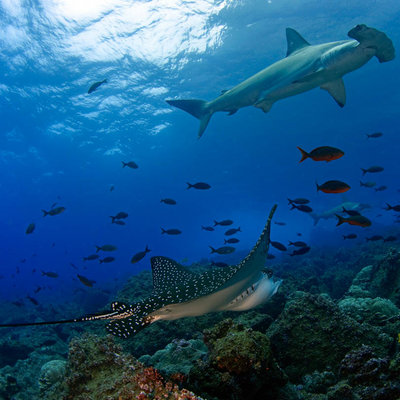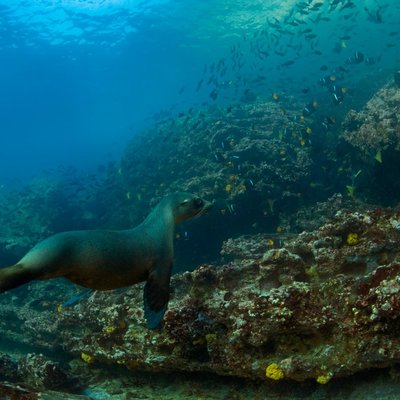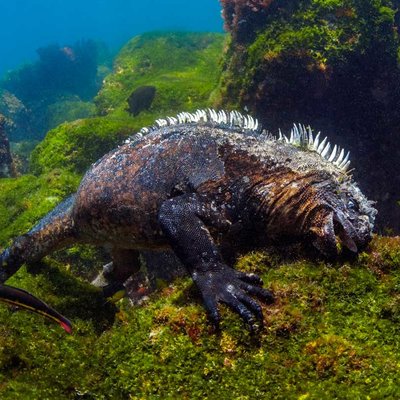GALAPAGOS SHARK DIVING
- Galapagos -
SCIENCE & CONSERVATION CHARTERS
THE TRIP
Galapagos Shark Diving in collaboration with The Galapagos Whale Shark Project would like to invite you on a SCUBA Dive Liveaboard with AMAZING WHALESHARK DIVING!
Dive with a Purpose - combine an incredible dive experience with research & conservation of Whale Sharks!
"I became more aware of how whale sharks had been exploited historically and also how industrial fishing both targeted and incidental was beginning to seriously affect certain populations. With this came the realisation that without baseline data and at least a rudimentary understanding of their life cycle there is no manner in which we can create the platform, legal and physical to protect them." - Jonathan R. Green
The Galapagos Marine Reserve (GMR), which straddles the equator approximately 600 nautical miles from the coast of Ecuador, is one of the largest marine reserves in the world. Its protected waters extend 40 nautical miles from a baseline connecting the major islands covering a total area of 130,000 square kilometres of Pacific Ocean and featuring a dynamic mix of tropical and Antarctic currents and rich areas of upwelling. The (GMR), contains an extraordinary range of biological communities, featuring such diverse organisms as penguins, fur seals, tropical corals, large schools of hammerhead sharks and the world’s largest fish, the whale shark, Rhincodon typus.
Listed as Endangered in the IUCN 2016 Red List, Whale Sharks are threatened mainly by fishing activity. Traditionally hunted for their liver oil and for waterproofing wooden boats they are now widely sold for their characteristic white meat (referred to as “tofu shark” in Taiwan). Rapid reductions in numbers caught per unit effort have been seen in several areas where they have been fished including India and Taiwan, indicating that local populations are particularly susceptible to overfishing. Slow growth, late sexual maturation and potentially low reproductive rates mean that localised populations are unlikely to recover after collapse due to fishing.
Questions such as where they breed, where they give birth and where the young live for the first 3-5 years of life, are some of the questions the Galapagos Whale Shark Project has been trying to answer. The answers to these questions and more are necessary if we are to protect the species against the threats that face the future of all marine life.
Join the project on a seven-night / eight-day liveaboard into the Galapagos Marine Reserve, with local Guides & Dive Masters ( making the ration 1:4 divers) accompanied by the whale shark experts Jonathan R. Green, Simon J. Pierce, Sofia Green or Jenny Waack! Although you won't be tagging or touching the whale sharks your help is needed to record the whale sharks with your photography. Each day there will be presentations, talks on, how the research is being used and what the data tells us. If you're unsure on photography the team was involved in the filming of David Attenborough's' Blue Planet II so there will be a comprehensive guide to what to look for and photograph.
Feel great that you're helping to support these majestic gentle creatures and looking to protect their future.
THIS WILL BE A DIVE LIVEABOARD EXPERIENCE LIKE NO OTHER!
OUR MISSION - WHY WE LOVE WHAT WE DO
We love ...
... to offer a very special diving experience, with one goal - to promote the research & conservation of whale sharks, but with such an unbelievable experience you will be AMAZED!
... to draw the world's attention to the endangered whale sharks & to provide detailed information on how everyone can help save the gentle giants of the oceans.
… tell you & the world about the Galapagos Whale Shark research project. How you can make a direct positive contribution.
… to show you how to become a Citizen Scientist & support research on many shark species.
... the research work & we are happy that you through your support, you give us the opportunity to spend more time on the project, & more importantly the protection of whale Sharks.
Give back to nature and marine life!
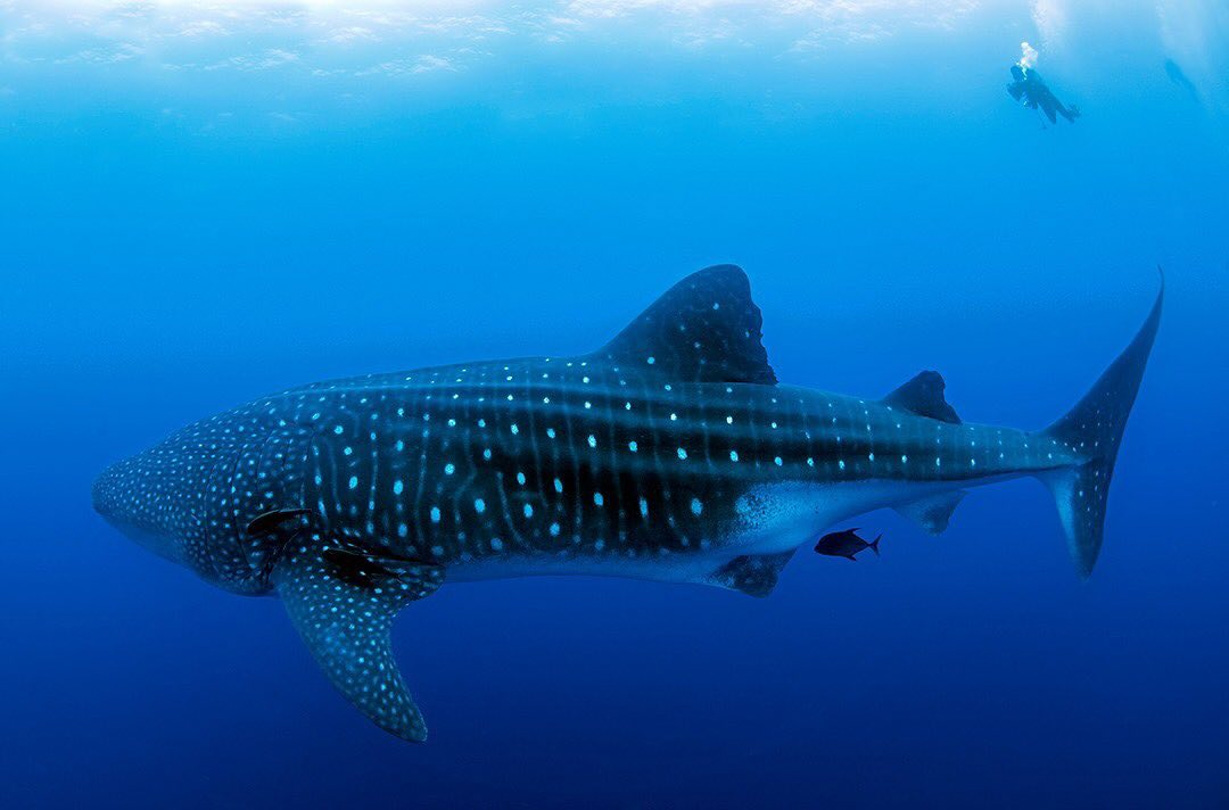
OUR OBJECTIVE
The overall objectives of the study are:
At a local level, understand the importance of the Galapagos Marine Reserve (GMR) to whale sharks.
At a regional level, increase our knowledge of whale shark migratory patterns and reproductive behaviour.
At a global level, raise awareness of whale sharks, as ambassadors for sharks and marine conservation.
Ascertain the feasibility of creating protected areas both on a regional and global level.
Document the natural history using underwater video, diving and eventually by submersible.
In order to achieve these objectives, we aim to:
Build the local capacity in the study of whale sharks, through the use of acoustic & satellite technology and collaborative analysis of results.
Characterise the population abundance & social structure of whale sharks visiting the GMR using photo/video identification.
Assess the seasonality of whale shark occurrence within the GMR with relation to environmental triggers such as changes in major currents.
Determine the migratory movements taken by whale sharks in the Eastern Tropical Marine Corridor region by use of MiniPAT, SPOT and SPLASH
Determine the occurrence of aggregations & reproductive behaviour, within and outside the GMR.
Raise local awareness of the importance of the GMR for migrating pelagic species using whale sharks as an example, with emphasis on schools.
Raise global awareness of the importance of the oceans, as a finite resource and the basis for a healthy planet, that are being plundered and polluted.
YOUR TOUR LEADERS
(Depending on the trip dates two experts will accompany you)
JONATHAN R. GREEN is the founder and director of the Galapagos Whale Shark Project.
His early fascination with whale sharks led to the creation of the Galapagos Whale Shark Project in the hope to better understand the relevance of the Galapagos Islands in the whale sharks life cycle.
He is a graduate of the University of North London, an elected member of the Royal Geographical Society of London and, when not on the Galapagos, works on expedition ships in the polar regions. He also teaches photography workshops in locations around the world and has received several international awards.
With over several thousand dives in the surrounding waters of the Galapagos, nearly three decades of working in this region he will lead your tour.
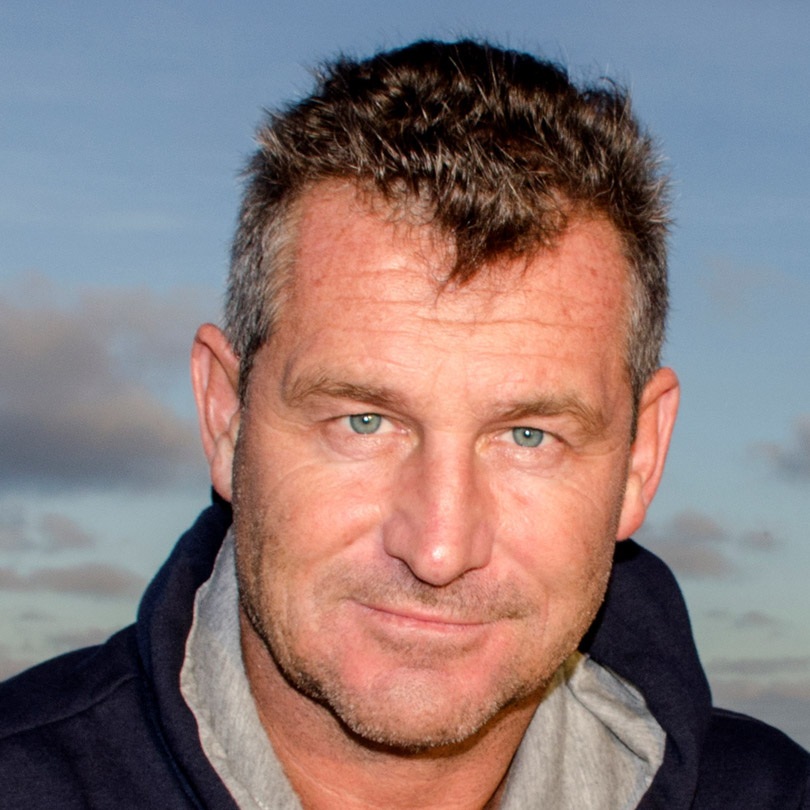
Mr Jonathan R. Green, FRGS
Tour Leader Galapagos Shark Diving
Director Galapagos Whale Shark Project
JENNY WAACK is the founder of Galapagos Shark Diving which supports the research of the Galapagos Whale Shark Project.
After graduating in International Investment Analyst & working for many years in Investment & Retail Banking in Germany, she decided to follow her passions - travelling, diving and discovering the world. On her travels, she fell in love with whale sharks, the Galapagos Islands and the marine environment. It was this that has made her dedicate her life to protecting these gentle giants and the oceans.
She founded Galapagos Shark Diving to create a platform to support different research projects in the Galapagos, especially the Galapagos Whale Shark Project.
When she is not involved in diving or research, she works on an expedition ship in remote polar regions and promotes the conservation awareness of the marine environment.
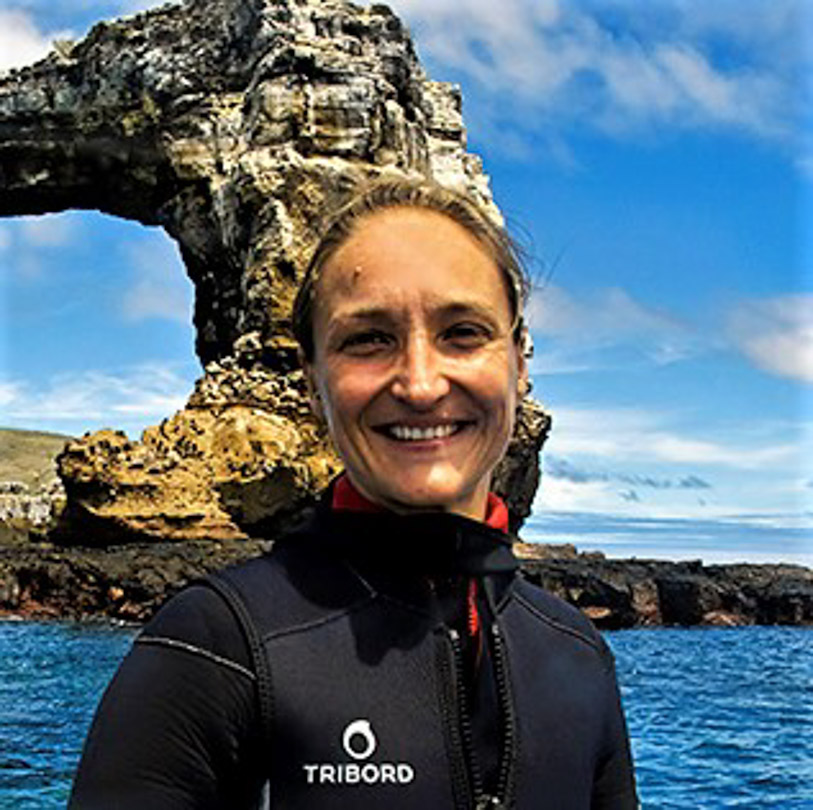
Mrs Jenny Waack
Tour Leader Galapagos Shark Diving
Founder Galapagos Shark Diving
SOFIA M. GREEN Iturralde grew up in mainland Ecuador, but always had a connection with the Galapagos Islands through her parents’ work in conservation. After graduating from university, she moved to the islands to work towards their conservation.
She is currently completing an international master’s degree in Marine Biological Resources (IMBRSea) with a focus on conservation & ecology. She joined the Galapagos Whale Shark Project in 2017 as an intern & now works in the project as a research assistant & data analyst.
She has been involved with other marine conservation projects on marine invasive species, marine debris (plastics), marine turtles conservation, & the ecological monitoring of the Galapagos archipelago.
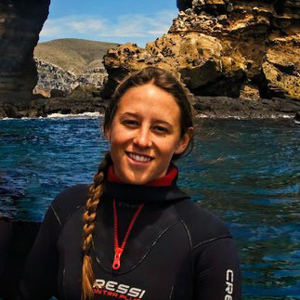
Mrs Sofia M. Green
Tour Leader Galapagos Shark Diving
Research Assistant/Data Analyst Galapagos Whale Shark Project
DR SIMON J. PIERCE is a marine conservation biologist & wildlife photographer from New Zealand. He is a co-founder and Principal Scientist at the Marine Megafauna Foundation, where he leads the global whale shark research & conservation program.
Simon led the global conservation assessment of whale sharks for the IUCN Red List in 2016, which identified the species as endangered, then led the technical proposal that successfully uplisted whale sharks to Appendix I of the UN’s Convention on Migratory Species in 2017.
Simon is also an award-winning marine wildlife photographer. His photography & videos have been widely published by international media, including National Geographic, BBC, New Scientist & many others.
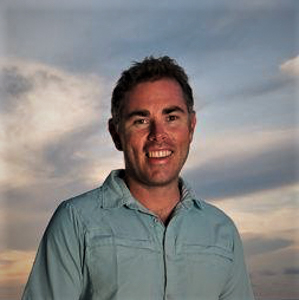
Dr Simon J. Pierce
Tour leader Galapagos Shark Diving
Founder Marine Megafauna Foudation
AQUA - THE VESSEL
The AQUA provides a unique and unforgettable experience, with the best service and diving that you could hope for. The boat has nine cabins with ensuite bathrooms, air conditioning, electricity and all that you may need to make your stay comfortable. Our yacht is nicely designed and furnished, but it’s our operating staff that complete your experience onboard and in terms of safety, care and maintenance, they are second to none.
The Vessel
The upper cabins on the main deck have windows that will allow you to enjoy the beautiful sunrise and sunsets of the Galapagos Islands. The lower cabins have portholes with an ocean view and natural light.
A very spacious lounge & dining area with wood surround allow comfort and a great area for working with cameras, photography and lectures/workshops.
After each dive, guests can relax in the lounge, on the sundeck or outer decks ideal for yoga, simple meditation or wildlife observation. All meals will be a mixture of local and international cuisine and hearty fare for divers.
With the capacity for 16 divers but restricted to 14 divers, it means you will have personalised service, space to relax & a really comfortable relaxed trip. All dives are done from a dive panga, (tender) which offers easy access to all of the best dive locations.
Facilities:
- Twin-share Cabins with ensuite ( one price for all types - please request double bed on booking)
- Large Saloon with bar & conference area
- Dining room
- Upper deck to relax with sunshade area's
- Onboard chef
- Large dive deck with camera table
- Diving from the dive tenders with a local guide & project team member
THE GALAPAGOS ISLANDS
The Galápagos Islands are situated in the Pacific Ocean some 1,000 km from the South American continent, these 19 islands and the surrounding marine reserve have been called a unique ‘living museum and showcase of evolution’. Located at the confluence of three ocean currents, the Galápagos are a ‘melting pot’ of marine species. The ongoing seismic and volcanic activity reflects the processes that formed the islands. These processes, together with the extreme isolation of the islands, led to the development of unusual animal life – such as the land iguana, the giant tortoise and the many types of finch – that inspired Charles Darwin’s theory of evolution by natural selection following his visit in 1835.
Today the wildlife abounds with whale sharks, hammerhead sharks and Molas, and that's just under the water. With such diversity of wildlife, every day is a wonder!
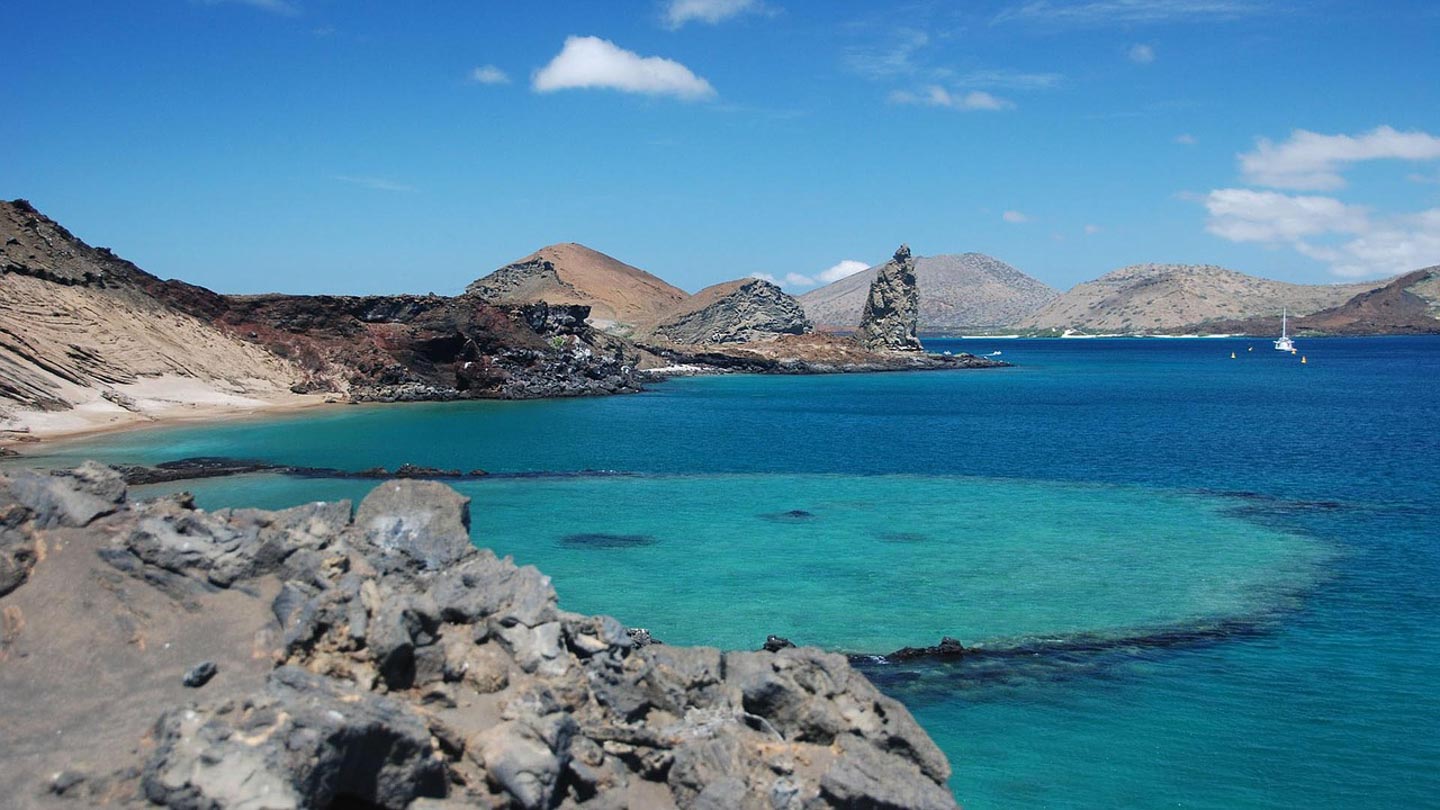
THE DIVING
The diving is amazing but please keep in mind that it is varied & demanding. Diving is for advanced divers because of the extreme conditions - cold water, strong currents, and limited visibility, but nevertheless, there are very good sites for intermediate divers. Divers visiting the Galapagos must have an Advanced Open Water rating & more than 50 logged dives.
Surface water temperature range from 18-25°C (64-77°F). In contrast, temperatures at depth can drop to 13°C (56°F) and thermoclines (generally occurring between depths of 12-18m (40-60ft)).
All diving will be conducted from dive tenders in small groups, up to four divers with a local guide. Maximum depth is the recreational limit of 30m.
With the Whale sharks ranging in size of 12-14 meters, every dive with these large fish is awesome!
- Maximum 14 divers on the trip
- Whale sharks + whale sharks + whale sharks
- Hammerhead Sharks
- Molas & marine Iguanas
- Visit Wolf & Darwin Islands
- Local Guides & DM - Ratio 1:4 divers
- Diving from tenders
- AMAZING Diving
TERMS & CONDITIONS
Due to the remoteness, dive conditions & exclusive use of the vessel, the following terms will be applied.
A deposit will be required on booking to secure your spot. The departure dates are guaranteed to run, no minimum numbers to be reached.
DIVING REQUIREMENTS:
- Minimum of Advanced Open Water Diver
- 50 logged dives
INSURANCE REQUIREMENTS:
- Travel Insurance & Dive Insurance is mandatory - Insurance must cover emergency evacuation & medical costs
- (Standard dive waiver & liability waiver will need to be signed on board. A PADI sample copy is here. Any medical questions with a yes MUST be accompanied by a doctors clearance as outlined in the document)
PAYMENT REQUIREMENTS:
- A non-refundable deposit of 30% per person will be applied to secure your spot
- Full payment due 120 days before the departure date
COVID-19 Policy
The Galapagos Shark Diving Trip/ Team recommends that you have a clause in your travel policy that covers such future outbreaks, as there is NO COVID policy offered by the supplier.
CANCELLATION POLICY:
- 364 to 120 days until departure loss of deposit
- 119 days or less from the scheduled departure date 100% cancellation fee ( full trip cost) is applied

